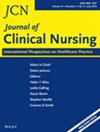Clinical Validation of the Nursing Diagnosis ‘Inadequate Health Self‐Efficacy’ in People With Hypertension
IF 3.2
3区 医学
Q1 NURSING
引用次数: 0
Abstract
AimsTo test the clinical validity of clinical indicators and causal relationships of aetiological factors of the new nursing diagnosis of inadequate health self‐efficacy in people with hypertension.BackgroundThe diagnosis of inadequate health self‐efficacy has both theoretical and content validity. However, a clinical validation study is needed to establish an appropriate framework for distinguishing individuals who manifest this unique human response.DesignThe study adopts a cross‐sectional clinical validation approach, adhering strictly to the STROBE guidelines throughout its design and implementation.MethodsNaturalistic sampling was used to identify 302 adults diagnosed with hypertension. Their data were subjected to latent class analysis, which facilitated the identification of a comprehensive set of clinical indicators that demonstrated better diagnostic accuracy and established posterior probabilities to guide the inference of inadequate health self‐efficacy. In addition, logistic regression analysis was used to assess the magnitude of the impact of aetiological factors.ResultsThe prevalence of inadequate health self‐efficacy was 76.61%. Among the 13 indicators examined, seven demonstrated notable sensitivity: ‘risk‐prone health behaviour’, ‘failure to take action that prevents health problems’, ‘inadequate self‐control’, ‘avoidance behaviours’, ‘negative health self‐perception’, ‘inadequate health‐related quality of life’ and ‘difficulty feeling good about adopting a healthy lifestyle’. Additionally, two indicators showed high specificity: ‘difficulty feeling good about adopting a healthy lifestyle’ and ‘inadequate adherence to treatment regimen’. Notably, 15 aetiological factors were identified as significantly associated with an increased risk of inadequate health self‐efficacy.ConclusionsA clinical framework consisting of eight clinical indicators and 15 aetiological factors was developed to characterise inadequate health self‐efficacy in individuals with hypertension.Relevance to PracticeClinical validation provides insight into the precision of clinical indicators and the magnitude of the effect of putative causal elements, thereby facilitating identification and tailored intervention for individuals with hypertension and inadequate health self‐efficacy.高血压患者 "健康自我效能感不足 "护理诊断的临床验证
目的检验高血压患者健康自我效能不足这一新护理诊断的临床指标的临床有效性和病因关系。背景健康自我效能不足的诊断具有理论和内容的有效性。本研究采用横断面临床验证方法,在整个设计和实施过程中严格遵守 STROBE 准则。对他们的数据进行了潜类分析,从而确定了一整套临床指标,这些指标显示出较好的诊断准确性,并建立了后验概率以指导健康自我效能不足的推断。结果 健康自我效能不足的患病率为 76.61%。在研究的 13 个指标中,有 7 个指标显示出显著的敏感性:"易发生风险的健康行为"、"未能采取预防健康问题的行动"、"自我控制能力不足"、"回避行为"、"消极的健康自我认知"、"与健康相关的生活质量不足 "和 "难以对采取健康的生活方式产生良好的感觉"。此外,有两个指标显示出高度的特异性:"难以对采取健康的生活方式感到满意 "和 "对治疗方案的依从性不足"。值得注意的是,有15个病因因素被认为与健康自我效能不足的风险增加有显著关联。结论建立了一个由8个临床指标和15个病因因素组成的临床框架,用于描述高血压患者健康自我效能不足的特征。对实践的意义临床验证有助于深入了解临床指标的精确性和假定病因因素的影响程度,从而有助于识别高血压患者和健康自我效能不足患者,并为其提供有针对性的干预。
本文章由计算机程序翻译,如有差异,请以英文原文为准。
求助全文
约1分钟内获得全文
求助全文
来源期刊
CiteScore
6.40
自引率
2.40%
发文量
0
审稿时长
2 months
期刊介绍:
The Journal of Clinical Nursing (JCN) is an international, peer reviewed, scientific journal that seeks to promote the development and exchange of knowledge that is directly relevant to all spheres of nursing practice. The primary aim is to promote a high standard of clinically related scholarship which advances and supports the practice and discipline of nursing. The Journal also aims to promote the international exchange of ideas and experience that draws from the different cultures in which practice takes place. Further, JCN seeks to enrich insight into clinical need and the implications for nursing intervention and models of service delivery. Emphasis is placed on promoting critical debate on the art and science of nursing practice.
JCN is essential reading for anyone involved in nursing practice, whether clinicians, researchers, educators, managers, policy makers, or students. The development of clinical practice and the changing patterns of inter-professional working are also central to JCN''s scope of interest. Contributions are welcomed from other health professionals on issues that have a direct impact on nursing practice.
We publish high quality papers from across the methodological spectrum that make an important and novel contribution to the field of clinical nursing (regardless of where care is provided), and which demonstrate clinical application and international relevance.

 求助内容:
求助内容: 应助结果提醒方式:
应助结果提醒方式:


